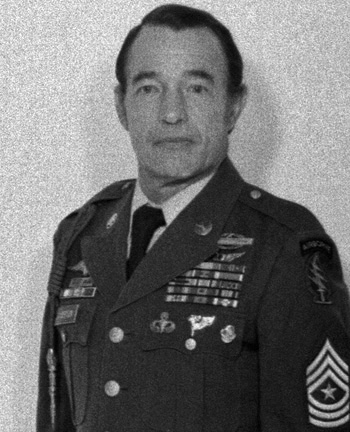
|
Eric E. Anderson |
 |
|||
| Rank, Service | ||||
Command Sergeant Major E-9, U.S. Army |
||||
| Veteran of: | ||||
|
||||
| Tribute: | ||||
Eric Anderson was born on January 15, 1924, in Paragould, Arkansas. He enlisted in the U.S. Army on May 31, 1943, and was trained as an airborne infantryman with the 517th Parachute Infantry Regiment at Camp Toccoa and Fort Benning, Georgia, and Camp Mackall, North Carolina, before deploying to Italy in May 1944. He participated in the Rome-Arno Campaign and made a combat jump into Southern France on August 15, 1944, but was badly wounded on August 31, and returned to the U.S. in November 1944. After recovering, he served at Fort Benning until he was honorably discharged from the Army on October 25, 1945. He joined the Wisconsin State Guard on August 27, 1951, and entered service with the Wisconsin Army National Guard in June 1952, going on active duty in the Army beginning August 1, 1954. Sgt Anderson trained at Fort Leonard Wood, Missouri, and Fort Sam Houston, Texas, before serving with the Medical Detachment of the 373rd Armored Infantry Division in West Germany in 1955. He transferred to the 33rd Scout Dog Platoon in West Germany and attended the Scout Dog Handler course from July to October 1956, and later served as an instructor with the 373rd Armored Infantry Battalion, also in West Germany. Sgt Anderson returned to the U.S. in May 1958, and served with Company E, 2nd Airborne Battle Group of the 503rd Infantry Combat Team at Fort Bragg, North Carolina, from May 1958 to May 1959, followed by service as an instructor with the Corps of Cadets at the U.S. Military Academy at West Point from May to October 1959. He then transferred to Walter Reed Army Hospital to help care for his terminally ill wife, serving there until her death in March 1960. His next assignment was as an instructor at Riverside Military Academy in Gainesville, Georgia, from June 1960 to June 1962, followed by service with the 2nd Battalion, 4th Cavalry Regiment in South Korea from July 1962 to July 1963. Sgt Anderson served as an instructor at the U.S. Army Training Center Armor School at Fort Knox, Kentucky, from August 1963 to August 1965, and then deployed to Southeast Asia where he served with the 5th Special Forces Group in South Vietnam from August 1965 to August 1966, followed by service with the 1st Special Forces Group on Okinawa from August 1965 to May 1974, during which time he deployed several more times in support of the war in Southeast Asia. After serving with the 1st Special Forces at Fort Devens, Massachusetts, Sgt Anderson served as a Drill Instructor with the Army ROTC detachment at the University of Vermont from July 1974 to September 1975, followed by Arabic-Syrian Language School at the Presidio of Monterey, California, from September to December 1975. His next assignment was as 1st Sergeant of Company D, 2nd Battalion, 3rd Basic Combat Training Brigade at Fort Dix, New Jersey, from December 1975 to July 1977, and then as Operations Sergeant and Command Sergeant Major with the 2nd Battalion, 10th Special Forces Group of the 1st Special Forces at Fort Devens from August 1977 until his retirement from the Army on January 31, 1979. After retiring from the Army, Eric participated in several covert operations in the early 1980's, one of which was an attempt to free American POWs from Laos. He later worked for the South Carolina Department of Corrections as a counselor helping to rehabilitate incarcerated veterans from May 1984 to July 1990. He then worked as a military contract policeman at Kwajalein Atoll in the Pacific Ocean from August 1990 to November 1994, and then in Kuwait in 1995. Eric Anderson died on September 25, 2009, and was buried next to his first wife at Arlington National Cemetery. |
||||
|
||||

